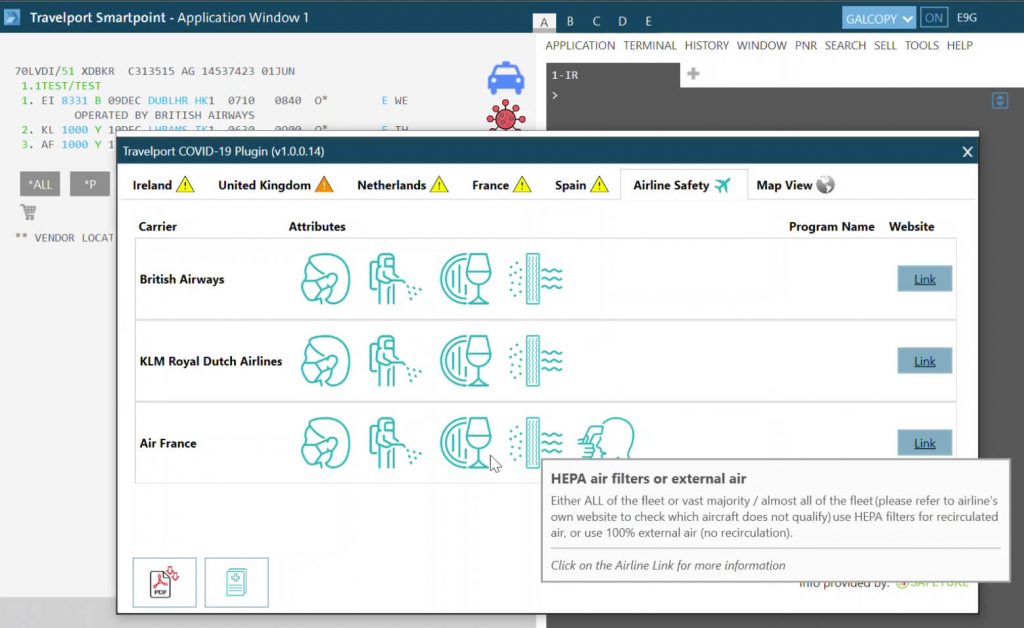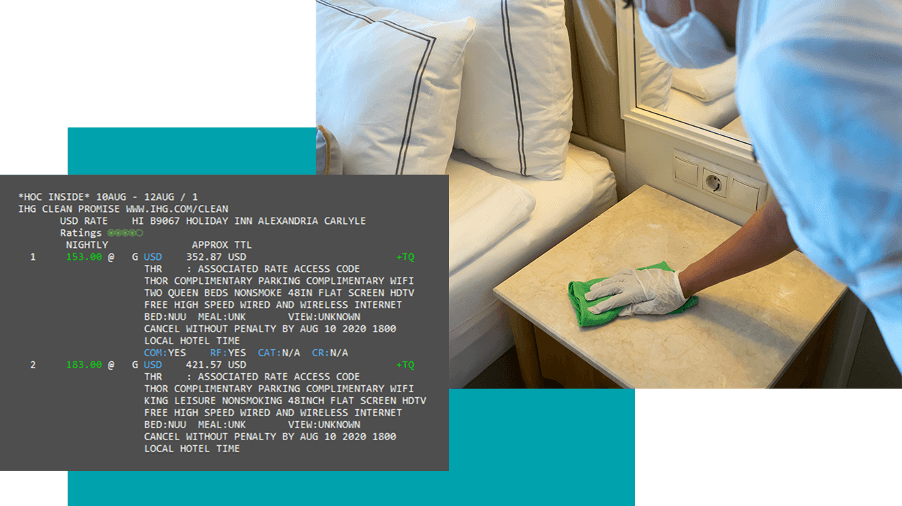Kyle Moore
Global Head of Customer Strategy & Marketing, Travelport
Share article
Safety is everyone’s top priority right now. In travel, especially so. The industry is working tirelessly to put the necessary measures in place to allow people to safely take to the skies, get on the road, and stay in hotels again. But are these measures aligned to what travelers want — and do they provide enough reassurance to stimulate bookings?
To find out, Travelport carried out research focused on travelers’ changing needs in the era of COVID-19. We cross-checked these findings against what our supply partners (air, hotel, car) are actually doing and published all of this in our Guide to Travel Recovery. What emerged from our research is that people want to travel, and are willing to — but only if stringent safety measures are implemented across all touchpoints of their journey. In addition, people also want the flexibility to cancel or amend their booking if their situation changes.
We have identified 10 categories that we found to be key to restoring consumer confidence — nine safety measures plus the added driver of keeping travelers’ money safe through flexible change/cancellation policies. The importance of each factor varies by supplier-type, but — overall — this shows that travelers want as many precautions in place as possible, plus the freedom to change their plans, if necessary, without losing out financially.
Travelers want to be sure that rigorous cleaning procedures are being followed, across all touchpoints of their journey. This includes:
Suppliers can meet or exceed traveler expectations and give them extra peace of mind by supplying them with sanitizing products:
Social distancing can be one of the trickier safety measures to implement, and for airlines it is not commercially viable to block the middle seat in the long run. Travelers say that effective social distancing will encourage them to book a flight, and they want to see this implemented:
The merits of widespread temperature checks, and who should conduct them, is still being debated by travel stakeholders, medical experts, and governments. From our research though, we can see that until a vaccine or effective treatment is available, air travelers, in particular, would like to see temperature checks being carried out both:
Mask wearing is becoming standard practice in many public settings, beyond just travel. This is acknowledged as an effective way of reducing community transmission of COVID-19 and is a simple solution for situations where social distancing is more difficult. Travelers seem to be embracing this trend too, with the results showing that they want this required:
Like mask-wearing, plexiglass is also becoming more common in retail and customer-service environments. Where contactless or entirely automated processes are not possible, this is the next-best alternative, with travelers wanting to see this, in particular, at airport check-in desks (56%).
Gone are the days of the dash to board a plane — perhaps one small positive from the pandemic. Travelers are likely to exercise much more caution at this stage of their journey now and want airlines to prevent crowding by managing boarding by row. This is important to 56% of travelers.
Travelers know that on many flights, full social distancing will not be possible. Like mask-wearing, HEPA air filtration provides them with some reassurance that they are safe in the cabin. This is important to 62% of travelers.
Before COVID-19, having a human face at a check-in desk or front of house was important to many people, and symbolic of quality customer service. But now, as people seek to reduce their in-person interactions and close contacts, technology will enable many travel businesses to creatively adapt their processes, increasingly support self-check-in. Travelers prefer contactless:
Like contactless services, mobile guest services will also allow travelers to rely less on in-person interactions in hotels. This may include room service, making reservations in a restaurant, booking leisure facilities, transfers, and more. This was important to 51% of travelers.
In addition to feeling physically safe throughout their travels, consumers also want to know that their money will be safe if they book. The COVID-19 situation is changing by the day, creating uncertainty and making some travelers hesitant to book. Travel suppliers now need flexible policies to make it possible for people to change their trip without incurring charges, or cancel and get a full refund if they become unwell, or if travel restrictions are reintroduced in either their departure point or destination.
At the same time, suppliers need to make agencies aware of this information so they can confidently guide people during booking. A notable 64% of people said that having fully flexible or refundable tickets was a ‘very important’ consideration that would influence them to book a flight. During our research, our airline, hotel, and car partners mirrored this view that flexibility around change/cancellations would play a key role in restoring traveler confidence.
Speaking about safety measures, Derek Sadubin, Managing Director, CAPA – Centre for Aviation, noted “Health and safety is understandably front of mind for travelers right now. The travel industry recognizes and respects this and, what’s encouraging, is that many suppliers, such as airlines, have already implemented the safety measures travelers say they need to book a domestic or international trip — but we still have a long way to go. Collaboration and communication are now key to restoring traveler confidence and securing a strong and responsible industry recovery.”
The research in our Guide to Travel Recovery showed that airlines, hotels, and car providers are — by and large — implementing the right measures that travelers want and need. So, the next step towards recovery is to thoroughly document and communicate all of this to people, something not as straightforward as it may sound.
Right now, people are inundated with information, news, and updates about COVID-19, across personal, professional, and public channels. The World Health Organization recently noted that this type of ‘infodemic’ makes it hard for people to find trustworthy sources and reliable guidance when they need it — even when they have access to high-quality information.
For travel businesses, this information overload makes it particularly difficult to cut through the noise and ensure safety messages are seen and heard. Plus, the situation on the ground in destinations — and the associated entry and exit requirements — are changing regularly, creating an additional challenge for agencies and destination marketing organizations.
But opportunity exists — even in a crisis of this magnitude.
Travel agencies have more potential than ever to add value in the booking process, and indeed our research is showing that people are now 33% more likely to use an agent than before COVID-19, with 82% more or as likely. Of this, 65% said that the reason they feel more confident booking through an agency is because they can provide the latest travel safety information. This highlights how important it is for agencies to be able to find this information quickly and conveniently.
In March, Travelport noticed agencies were facing a similar challenge when it came to staying on top of cancellation/change policies, and so we developed our policy tracker tool to support our agency customers. Based on the positive feedback we received about it, we developed something similar to aid industry recovery: our new Airline Health and Safety tracker.

We created the Airline Health & Safety tracker to help inform agents and consumers what to expect when travelling with 80+ airlines globally, and have expanded this for hotel and car providers.
To make life easier for our agency customers, we also developed a Smartpoint plugin, which gives travel agencies access to information on government restrictions, lockdowns, and safety measures across the globe — all within the agent’s workflow.
And on the supply side, we’re also helping our partners to communicate their safety messages directly to agencies via our platform. They’re doing this using our digital media solutions, which delivers safety messages to agencies at the point of booking.
All of this combined is helping to deliver safety information to travelers, giving them confidence that their well-being is of paramount importance across the travel ecosystem.

It’s more important than ever that we as an industry are aware of — and in tune with — what travelers want. We must continue to work ever more closely together to build our understanding of our customers’ needs and deliver it in such a way that they feel protected, both physically and financially. This is how, together, we can reconnect the world and drive real recovery.
You can read more about this in our Guide to Travel Recovery. I’m sure you’ll find it as insightful, interesting, and instructive as we did.
Safe travels, everyone.